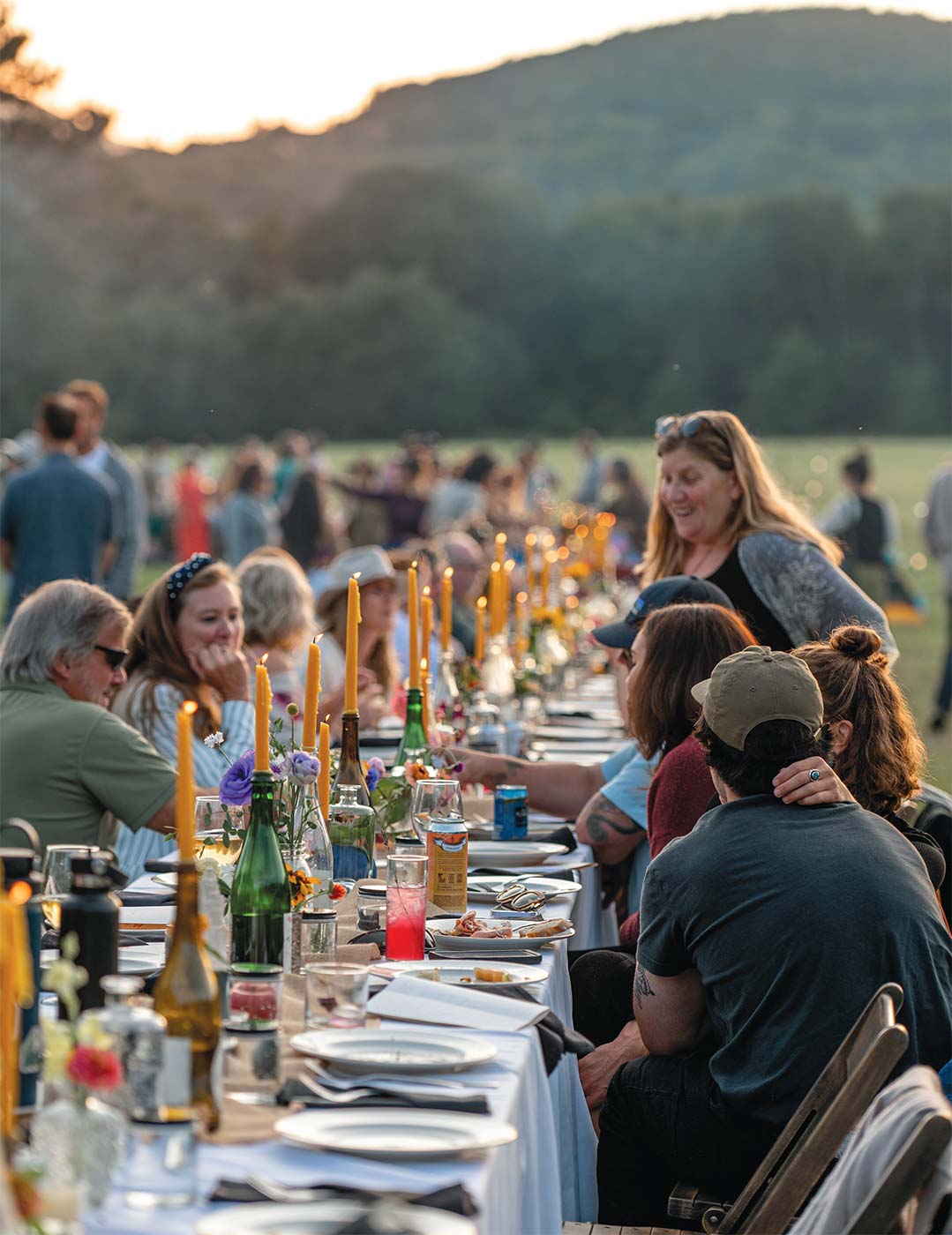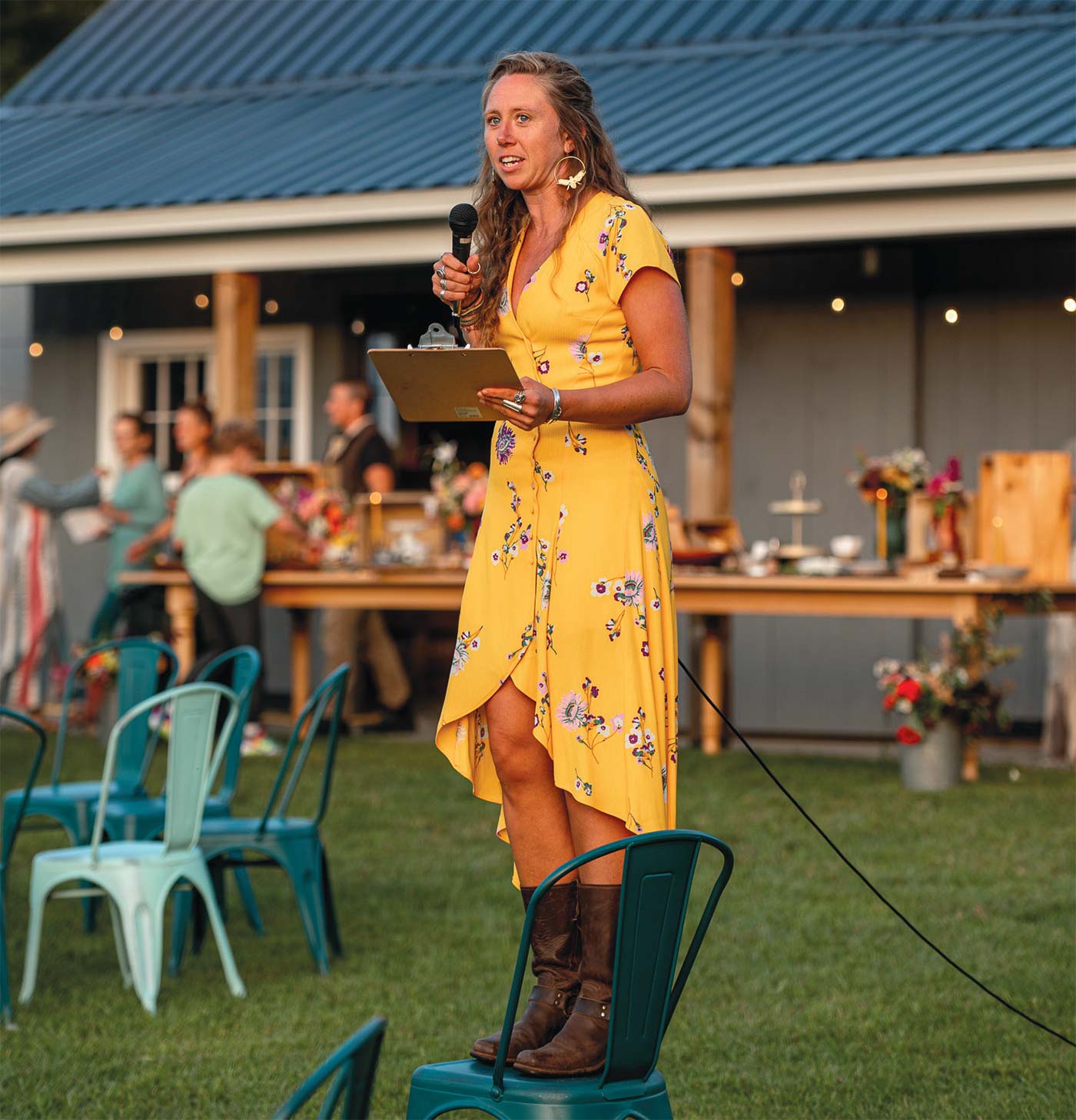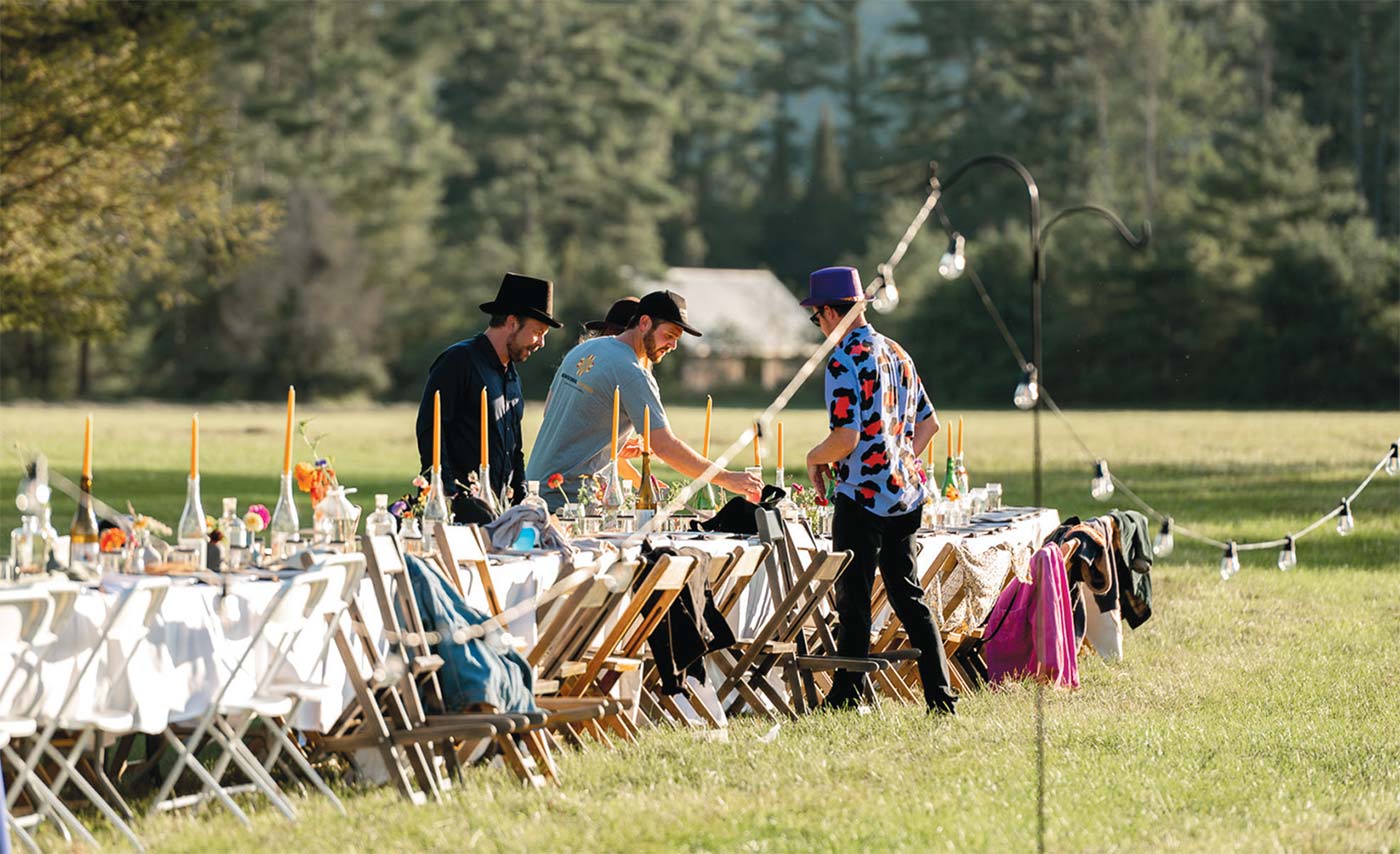F*#! the Flood

Haley and I have been organizing long-table, pop-up dinners featuring various cuisines and lineages: Italian, Indigenous, Nordic. This time would be different. This time the flavor had to be just Vermont with a fierce undercurrent of compassion and community.
As soon as the call went out, friends and strangers came from all corners of the state to offer whatever they had: fish, flowers, produce, a beautiful venue, and an abundance of time, energy, and expertise.
The stage would be Strawberry Hill, a 189-acre farm at the base of Mount Mansfield in Stowe, graciously offered up for the week by Molly and Dave Pindell of Sage Farm. Akash Parikh, owner of the Hearth & Candle, offered up his kitchen space where a dozen friends filtered in and out for days to prep food for the nine-course feast. Tiara Adorno, executive chef of The Crooked Ram in Manchester, was at the helm of the kitchen with Joe Chmielewski, Juniper’s Nick Gravel, and Hen of the Wood’s Peter Caride at her side. While Ed Cinque III devotedly tied up every loose end, an illustrious design team led by Kate Robinson of Wild Birch Design rounded up several flower farmers, hundreds of candles, and a vast collection of antiques and spent days adorning the property.
Meg D’Elia put her scientific background and culinary brilliance to work, batching cutting-edge cocktails using an 18th-century preservation method: milk clarification. Beyond enhancing flavor, this laborious technique cultivates an elevated texture. One drink featured West Farm beets, elderflower, and mezcal clarified with goat’s milk; another wed blueberry jam to Barr Hill gin. In the ultimate encapsulation of that late summer golden hour, Sipping Whiskey in the Garden was an unexpected combination of basil, heirloom tomatoes, and scotch, all clarified with raw cow’s milk. It’s late summer in all her glory, poured over a sturdy solitary cube of ice.


Devon Swinburne, one of the hosts of F*#! the Flood, addresses the crowd.
April’s heat wave followed by May’s late frost killed all the initial buds on local vineyards’ vines. Nevertheless, local winemakers Stella 14, Ellison Estate, and Iapetus didn’t hesitate to dig in to their reserves to stock the bar with natural wines.
When Edson Hill’s executive chef Jerome Picca came to drop off his delicate yet decadent Peach Gazpacho, he happened upon a last-minute crisis. The linen order had come with 15 tablecloths instead of the 40 required to cover the table that spanned nearly 300 feet. Despite service commencing in his own restaurant, within an hour he had conjured up 30 tablecloths from several restaurants across town—the table could be set.
When Kimberly Donahue from Waitsfield’s Round Barn came to drop off eight racks of wineglasses on a day’s notice, she assured the organizers, “Whenever a smoke signal goes up, we’ll be there. No matter what, we will show up. That’s the spirit of Vermont. It’s just what we do here.”
Miracles fell from the sky that night. Remarkably, it happened to be one of the only days of summer with zero chance of precipitation. In an ode to the “terroir of soil and sea,” a resplendent, 15-foot-long charcuterie board greeted the guests with the sweet sounds made by Long Gone John’s Halfgrass Quartet. Cocktail hour was accented by passed canapés: Woodard Farm steak tartare and Black Locust pork loin over corn pudding.


The event raised more than $20,000 for the Northeast Organic Farming Association of Vermont (NOFA-VT) Farmer Emergency Fund.
As the sun set, guests sat down to savor a cornucopia of heirloom vegetables and nearly a hundred pounds of linecaught Alaskan salmon donated by Honeywilya Fish, cooked outside on the wood-fired smoker loaned to the cause by Black Diamond Barbecue. Everything down to the water, 47 gallons harvested from a spring in Smuggler’s Notch, was thoughtfully sourced.
Eventually the stars made themselves known, the fires were lit, and an interactive candlelit dessert hour commenced. Dessert tables overflowed with hundreds of avant-garde macarons made by Small Oven Pastries as well as Maple S’mores with Sage Farm goat cheese—rustic sophistication at its finest. Dishing up notes of nostalgia, Shy Guy Gelato stocked the late-night scoop shop with a mint gelato that transported the diner back in time to a grandparent’s garden and the inevitable unruly patch of fuzzy mint that grew there.
All came together to break bread in support of the people who feed us: 19 days, 50-plus selfless volunteers, 50-plus contributing businesses, 9 courses, 250 guests, and 1 long table. An event of this magnitude usually requires months of planning and an expansive budget. When farmers were asked how the fund should be distributed, the answer was a unanimous “We’re okay, others need it more; send the funds to NOFA, the grants are easy to apply for and funds are delivered quickly.” In the end, the event raised more than $20,000 for the Northeast Organic Farming Association of Vermont (NOFA-VT) Farmer Emergency Fund.
In the words of the evening’s host, Devon Swinburne of South Londonderry, it was
An elegy to appetite.
An evening of equilibrium.
A fellowship of food and friendship.
“Do not let your hope weary,” she toasted the table in the midst of the meadow, as the sun’s last glow gave way to the clear sky’s first stars. “Vermont will put its strong head down, grow a thick skin, and with will and work, begin again.”

NOFA-VT Farmer Emergency Fund
By Bill Cavanaugh, Farm Business Advisor
Following is how the Northeast Organic Farming Association of Vermont (NOFA-VT) jumped in to action with immediate outreach and assistance for organic farms around the state impacted by the flood.
From day one, July 11, we started communications with farmers, offering guidance and technical assistance.
An important part of our response to this devastating flooding has been raising awareness about the NOFA-VT Farmer Emergency Fund. This fund, which has been around since 1997, is open to all Vermont-certified organic farmers and NOFA-VT members. We recently changed our membership tiers, reducing the annual fee to $1 to eliminate cost as a barrier. Folks can join as a member and can apply to the Farmer Emergency Fund from day one. Typically, with this fund, we provide $2,500 grants with an option for a $2,500 0% interest loan, too, but because of extreme devastation experienced all around the state, we increased the amount per grant to $5,000 for the time being. We recognize that $5,000 is not a lot in the overall scope of loss many farmers have experienced, but we know it can really be a short-term cash-flow boost. As of the end of August, we’ve received 130 applications to the fund and by early October, we anticipate that we will have given grants to at least 150 farmers.
The fund is entirely reliant on donations made by individuals and foundations. There’s been an incredible outpouring of support. We’ve also seen a lot of fundraising events being held around the state, such as a band contributing a show’s ticket sales, a coffee shop setting aside a tip cup, and farms or businesses donating a portion of their sales—all to this fund. It’s been a really amazing community effort.
We’ve had a lot of folks reach out to request applications for neighbors who may not have the time or technical ability to apply for the grant. Many of them have gone up the hill and helped the farmer complete the application. There’s also been a lot of volunteerism where people show up to help farms clean up from the flood, where many hands and people working together made the really tough clean-up phase manageable.
Every farmer I’ve talked with has been affected by this storm and subsequent frequent rains in different ways. The situation proved devastating for large-scale farms with six-figure losses as well as for smaller operations for whom a $10,000 loss is just as catastrophic. Everyone is feeling the pain in their own way, at their own scale.
NOFA-VT
By Erin Buckwalter, Development and Engagement Director
We are moved by the outpouring of community support. As soon as the floodwaters hit, we put out the call for donations to support these relief efforts, and people truly showed up; we’ve received donations from more than 2,600 people to date. As of August 31, we’ve awarded more than $584,000.
The scale of need is massive and federal relief has not come, so any funds we raise are a lifeline for the many affected farmers and farms. Beyond short-term funding relief, we are also continuing to advocate for emergency relief. We’ve been regularly meeting with our federal delegation, the Farm Service Agency, and the Agency of Agriculture, Food, and Markets to communicate farmers’ needs and to advocate for support in the swiftest way possible. We won’t quit. We’re also helping farmers report losses and working one-on-one with farmers and other food businesses, helping them navigate the challenging decisions ahead of them in the aftermath of this crisis.
Vermont’s small, diversified, and organic farms are the bedrock of our working lands, our local food system, and our healthy ecosystems. They are the frontlines in our work to combat climate change. Their organic practices clean water, increase biodiversity, sequester carbon in healthy soils, foster ecosystem health, and provide healthy, local, organic food to their communities. Thanks to all who have supported our flood relief efforts in any way, and know that it’s not too late to get involved. nofavt.org/ways-to-help.




